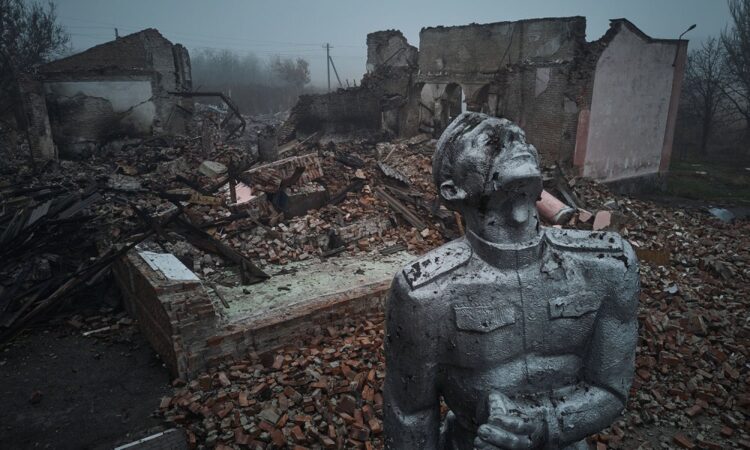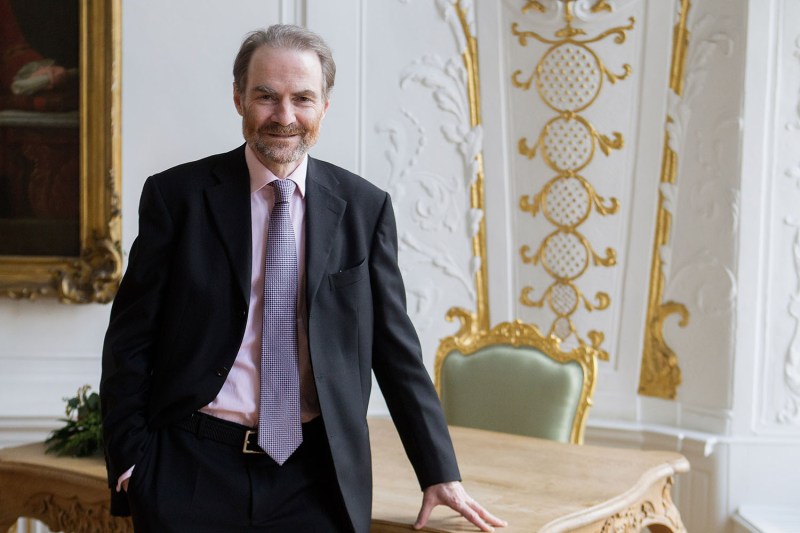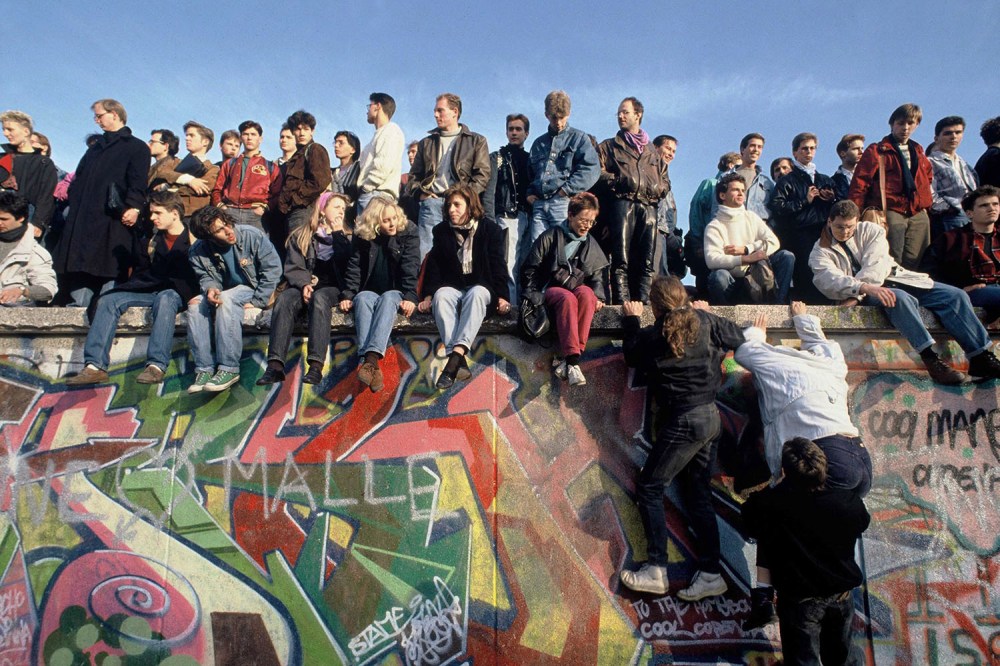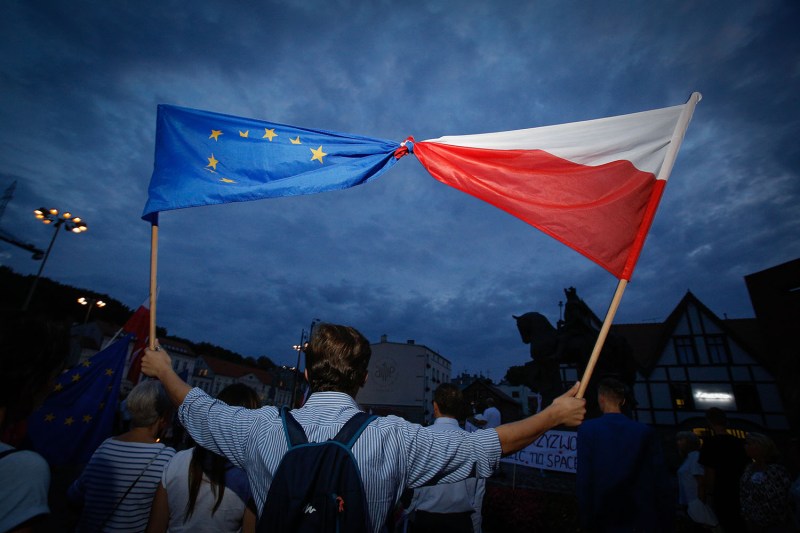
The downward turn of recent years serves as a reminder that the democratization of European states is a much more recent and fragile process than many Europeans realize. Garton Ash was born in 1955 into a Europe of dictatorships. In his youth, 289 million Europeans lived in democracies, while 389 million suffered under authoritarian regimes—not just the ones beyond the Iron Curtain but those in Southern Europe as well. Francoists would still raise their right arm with a fascist salute; the Greek colonels who came to power in 1967 would not only torture and kill but also ban “long hair, mini-skirts and the study of sociology,” he writes.
It was the collective memory of war and authoritarianism, in Garton Ash’s telling, that drove postwar European peace and integration. Yet, after two decades that consolidated a free way of life on the continent, Garton Ash writes, this “memory engine” appears to be sputtering. No country has joined the European Union since 2013; Britons voted to leave the bloc; war and the entrenchment of autocratic figures such as Hungary’s Viktor Orban have threatened the EU’s eastern flank.
Homelands deftly traces the transformations of the European project. It is a deeply moving journey through the past 50 years, as well as a reckoning with liberalism that holds lessons for what Garton Ash sees as a new era beginning with Russian President Vladimir Putin’s invasion of Ukraine. It is also a meditation on the very nature of history itself and on what it means to write its first draft—an art that Garton Ash, straddling journalism and academia, has been refining for half a century.
Timothy Garton Ash poses for a portrait in Aachen, Germany, on May 2, 2013. Mathis Wienand/Getty Images
Garton Ash is the most European of Englishmen but also the most English among Europeans. Fluent in many languages, a tireless traveler on the continent where he considers many countries “homelands,” he has long sought to explain to the British the people they regard as funny foreigners. (He and other historians convinced former British Prime Minister Margaret Thatcher that German unification posed no perils. In the end, he writes, the Iron Lady decided to “be very nice to the Germans.”) He has also been an important voice in foreign policy elsewhere: Former U.S. President George W. Bush, before his first trip to Europe, asked him innocently whether the United States should want the EU to succeed; generations of German politicians, especially when post-1989 insecurities about a new global role for the country became acute, have sought Garton Ash’s counsel.
In Homelands—a personal, but not intimate, book—Garton Ash recounts his youthful travels around the continent when it was still a world of borders and different currencies scarcely imaginable to today’s youth, used to the euro and low-budget airlines. He settled in East Berlin to work on a doctorate in German history but was drawn into writing about current affairs. After writing a book on the dictatorship in East Germany, he witnessed the beginnings of Solidarity, the Polish trade union striving for freedom, in the early 1980s.
Garton Ash shows brilliantly how different factors aligned for Europe to triumph in 1989. The ’80s were the age of Eurosclerosis, when the project of integration was stalling and public debates across the continent were dominated by fears of nuclear war and environmental catastrophe. (Garton Ash noted in his diary on Dec. 31, 1980, in all capital letters: “We will see a nuclear war in this decade.”) In his account, it was individuals who made the difference: Thatcher, Soviet leader Mikhail Gorbachev, and U.S. President Ronald Reagan, obviously, but also German Chancellor Helmut Kohl and European Commission President Jacques Delors.
The prospect of completing the single European market by 1992, along with plans to introduce the euro—which preexisted the fall of the Wall—made Europe look attractive again. Even Gorbachev saw what he called a “giant rising” next to the decaying Soviet empire—an impression that strengthened his resolve to create a “common European home” (one of the many expressions in the book one cannot help but read with bitterness after Russia’s invasion of Ukraine on Feb. 24, 2022).
Leaders came to trust one another, and changes in leadership were fortunate: Gorbachev preferred the sober George H.W. Bush—who wisely refrained from any triumphalist talk when the Soviet Union crumbled—to his predecessor. Leaders also came to trust different European peoples: Gorbachev, for instance, was moved by his enthusiastic reception in West Germany in the spring of 1989, not least among steelworkers in Dortmund, where chants of “Gorbi, Gorbi” gave rise to the neologism “Gorbimania.” The Soviet leader left convinced that the two German states might be allowed to unify without threatening European peace.
The danger was that, in retrospect, reaching political scientist Francis Fukuyama’s “end of history”—or the triumph of liberal democracy—could seem inevitable. In fact, Garton Ash writes, it was a “one-in-a-million piece of historical luck.” Contingency always matters; sometimes stars, and human courage and luck, align in what Garton Ash calls the “struggle for freedom”—and often, they just don’t.
People climb onto the Berlin Wall on Nov. 10, 1989, the morning after an announcement by the East German government that it would start granting exit visas to East Germans eager to go to the West. Robert Wallis/Corbis via Getty Images
The years between the fall of the Wall and the financial crisis feature in the book under the somewhat deceptive heading “Triumphing.” As we know now—and as Garton Ash makes abundantly clear—they are better described as decades of hubris and disillusionment. Freedom no doubt advanced, as Central and Eastern European countries, in fits and starts, established democracies and markets and prepared to join NATO and the EU. As the Polish dissident Adam Michnik once put it, Central Europeans just wanted “Liberty, Fraternity, Normality.” Yet, Garton Ash writes, “getting to that non-experimental normality would require a huge experiment,” often in the form of shock therapies, as liberal democracy and capitalist economies were created simultaneously. That experiment was not always unsuccessful: While it may have seemed at the time that Poles were getting only shocks and no therapy, the average Polish family may have a higher standard of living than the average British one by the end of this decade. Still, moving quickly created many injustices. In the felicitous phrase of the social theorist Ernest Gellner, the “price of velvet”—that is, velvet, nonviolent revolutions—was that the nomenklatura retained privileges and had a head start in the quest for economic and political power.
The transition exacted a huge cost in social cohesion. Workers in Poland once chanted, “There’s no freedom without Solidarity”; by the early 2000s, the slogan had become, “There’s no solidarity in freedom.” The Gdansk shipyard, where the Solidarity movement had begun in 1980, went bankrupt in 1996. But freedom, understood as some basic control over one’s everyday life, also suffered: As Garton Ash puts it, “The locus of unfreedom moved from the state to the workplace.” The story of freedom in Europe did not proceed in a single straight line.
This was not the only disillusionment: Heroes of dissident movements in Central and Eastern Europe turned into ordinary politicians—which, in some cases, meant corrupt politicians. Even Czechs eventually tired of such a towering figure as Vaclav Havel (whom Garton Ash knew well); by the end, they no longer saw exemplary courage and integrity but only, Garton Ash writes, “theatrical gestures and moralistic preaching.”
Meanwhile, the self-restraint of Bush gave way to the hubris of his son’s America, where the financialization of everything and the trust in so-called self-regulating markets rightly discredited Western versions of capitalism after the 2008 crisis and where the belief in spreading democracy through military conquest, sorely disappointed in Iraq and Afghanistan, made Western freedom rhetoric ring hollow. The global war on terrorism turned out to be a colossal failure of political judgment; Garton Ash thinks Beijing should posthumously award al Qaeda leader Osama bin Laden its highest honors for leading Washington into a decade of “strategic distraction.”
And so the downward turn began and, arguably, continues today. Anti-liberal populists started to score victories across Europe. 2016 saw the greatest political defeat of Garton Ash’s life: Brexit. Garton Ash tells a familiar story about Britain’s decision to leave the EU, appearing contrite in the face of the supposed rebellion of those “left behind” by liberal elites. But he also offers a more interesting narrative—one that underlines his larger point about the role of individuals (and contingency) in history. Figures such as British Prime Minister Tony Blair, he writes, simply did not dare to make the case for the EU to the British people. Blair would never fail to say he was a “passionate European,” but he would only do so in Strasbourg. As a result, arguably, it was not just the economically deprived who voted for Brexit. Garton Ash reports that an old friend of his voted Leave; his father, he’s sure, would have done the same. Today, the British are paying the price for a failure of politicians—and intellectuals—to transform people’s mental map of where Britain truly belongs.
People rally in Bydgoszcz, Poland, on Aug. 31, 2017, for a Day of Solidarity and Freedom marking the anniversary of the 1980 Gdansk Agreement.Jaap Arriens/NurPhoto via Getty Images
Garton Ash sprinkles the book with reflections on his role as a “political writer.” After shooting to fame in his early 30s with witness accounts of the revolutions of 1989—classics by now—he could have settled into the life of an armchair expert on foreign affairs. Instead, he stuck to the ethos of the reporter. There are many moments in the book where one has to admire his ability to engage with very different people in very different parts of Europe and find the telling detail that only a writer with superb literary talents can spot.
Yet his career as a journalist for the British conservative establishment, writing for the Spectator, gets relatively short shrift. And he only briefly touches on the question of whether the Oxbridge crowd—including former British Prime Minister Boris Johnson, who made up outrageous stories about the EU—might not also have helped pave the way for Brexit, beyond the obvious press culprit: Rupert Murdoch, the Euroskeptic media magnate who owns a British tabloid, the Sun.
Garton Ash does concede, though, that he did not always avoid the main peril of punditry: the pressure to say something about everything. After 9/11, and the subsequent terrorist attacks in Europe, Garton Ash began writing about Muslims on the old continent. As he admits now, “This was not my subject, my world, but I felt I must engage with it.” As a result, Garton Ash committed what he sees as his biggest mistake as a political writer: dismissing Ayaan Hirsi Ali, a critic of Islam, as a “brave, outspoken, slightly simplistic Enlightenment fundamentalist” while advocating for onetime Oxford scholar Tariq Ramadan, a supposed paragon of liberal Islam who, Garton Ash concludes, turned out to be a “deeply unsavoury character.”
Perhaps it was the thought that liberalism should not itself become too strident, too sure of itself, that animated what was arguably not such a gaffe about “Enlightenment fundamentalism.” After all, as archliberal U.S. jurist Learned Hand affirmed in 1944, “the spirit of liberty is the spirit which is not too sure that it is right; the spirit of liberty is the spirit which seeks to understand the mind of other men and women.” As Garton Ash himself points out, a core paradox of liberalism is that “for liberalism to flourish, there must never only be liberalism.” It is a thought familiar from Garton Ash’s philosophical lode star Isaiah Berlin: Liberalism must be tested against alternatives and be the light-touch framework for a pluralist social world—not a set of doctrines, let alone an ethos of the “rich and powerful,” as Garton Ash, discussing the fleshpots of Davos, puts it.
This call for liberal self-reflection and restraint is not Garton Ash’s only lesson of 50 years of struggle for freedom. He also concludes that “any liberalism worthy of the name” must combine liberty and equality. The question, of course, is what equality means: Equality of “attention and respect,” in Garton Ash’s words, would appear to be relatively uncontroversial. But is a lack of respect really behind votes for anti-liberals? This can be a comforting story liberals tell themselves: If only we stopped looking down on folks in the countryside, all would be well. Except real socioeconomic gaps and immigration policies are at issue. (To his credit, Garton Ash visits some of Europe’s new walls, including the fences around a Spanish enclave in Morocco, and pleads for the EU to adopt a less cruel approach.)
Perhaps if the EU addresses those political issues, the memory engine can still power integration. The shock of Putin’s invasion has reminded Europeans that lofty talk of peace and prosperity through integration is deadly serious for Ukrainians and others still left out. Yet the engine can also be driven by myths and outright false memories: Putin has a story about the evils of Nazism, too; right-wing populists in power in Budapest and Warsaw are busy indoctrinating citizens that the years of freedom’s triumph after ’89 were an age of chaos and moral corruption. But Garton’s Ash’s deeply humane book—liberal also in the sense of generous and empathetic—is as good an antidote as any for those despairing of Europe and an impassioned defense against those who seek to destroy it.






